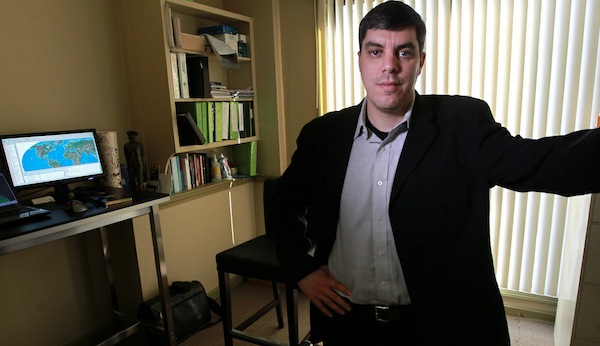

Originally built in a U.S. Naval laboratory as a way to protect government communications, Tor has grown into a wide-reaching project that helps individuals stay anonymous online. With an infusion of Knight News Challenge funds announced Monday, Tor will establish a multilingual help desk so that people using the software around the world can get instant assistance any time.
Tor’s software is free to download, and it works by distributing online transactions across the Internet so determining a person’s location based on his or her activity online is impossible. The project aims to empower anyone who wants control over his or her online footprints, but the journalistic value of such a tool is huge: Whistleblowers and tipsters can protect their identities, and journalists can publish without giving away their location in countries where governments would retaliate against them.
Countries using Tor the most, according to daily metrics, are the United States, Germany, Iran, Italy, France, and Spain. But Tor executive director Andrew Lewman says Tor has users “in every country in the world that has an Internet connection, except maybe North Korea.”
Tor will also use Knight News Challenge funds to enhance Tails, an operating system that lives on a preconfigured USB stick so that there’s no trace on the local system once the USB is unplugged. (Check out other Tor projects here.) It means journalists have the ability to publish discretely and anonymously, and without a laptop.
“You go into an Internet cafe, plug in the USB stick, and the computer will boot off the USB stick,” Lewman told me. “Then you have an anonymous operating system. There’s an email client. There’s a web browser. There are graphics and video editing tools, audio editing tools. So to take the extreme example: You are in — pick a country, pick a city, anywhere — and you witness a riot. You want to upload the video so it doesn’t get tied back to you. You don’t want the retribution but you want the video out there. Put down 20 bucks for an hour at the computer, upload your video, send it to YouTube or whatever, unplug the USB, and there’s no trace.”
Lewman says the goal is to use News Challenge funds “to make it much easier for journalists, who in some cases aren’t the most tech savvy, and also end up sometimes putting their sources at risk.”
But “the vast majority” of people using Tor are citizens who may simply want to stop advertisers from following them around the web. The example he gives is of a person who is searching “pancreatic cancer,” after finding out a friend has been diagnosed.
“Maybe you don’t care so much until you start tying that to your other search results,” Lewman said. “All the ads start changing to ‘Do you have cancer?’ More disturbing is when you go to CVS or Walgreens, and those sites will start [to feature cancer-related ads based on your Google search]. That is generally where it starts to get creepy. ‘I just want to be anonymous for five minutes to look up how to help my friend with pancreatic cancer.'”
It’s an issue that he says people are just beginning to think about now — especially in the context of sites like Facebook that attract advertisers with personal data that people opt to share. The team at Tor spends its days thinking about what the web will look like in the near future, and what that will mean for the ways people share and obtain information. “We think about the world five years from now,” Lewman said. “We want to have answers for when people want fully identified digital DNA.”
Lewman says when he thinks about what he wants for the digital future, it’s not technology or software that comes to mind. “The tool I’d like to have is actually freedom of speech and Internet privacy enshrined and enforced,” he said. “I myself would be much more loyal to companies if they would trust and honor my wishes with my data. I imagine a lot of other people feel the same way…They start out by saying we love you, we’ll cherish your data, but by page 16, paragraph five, it’s ‘We’ll sell your data to anybody possible, and you cannot opt out.'”